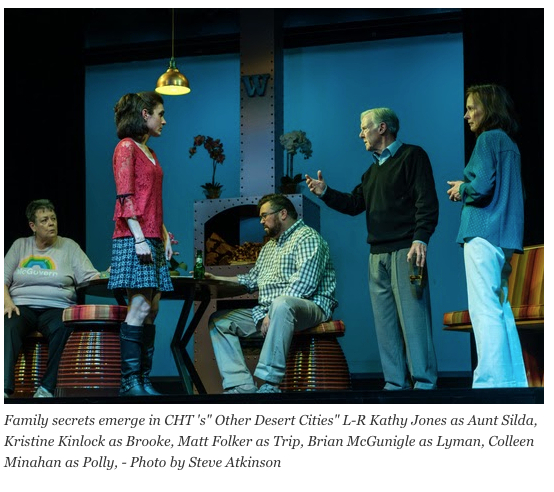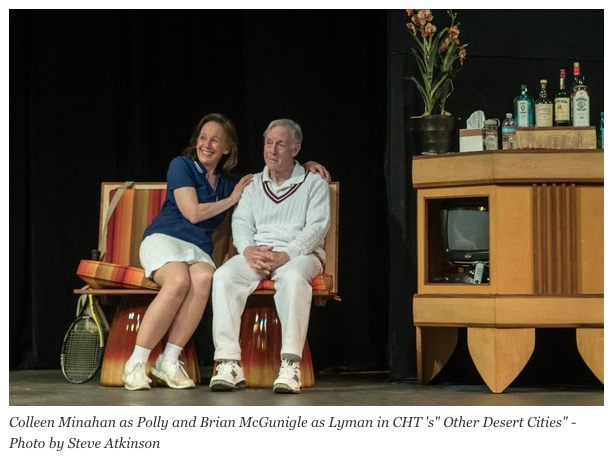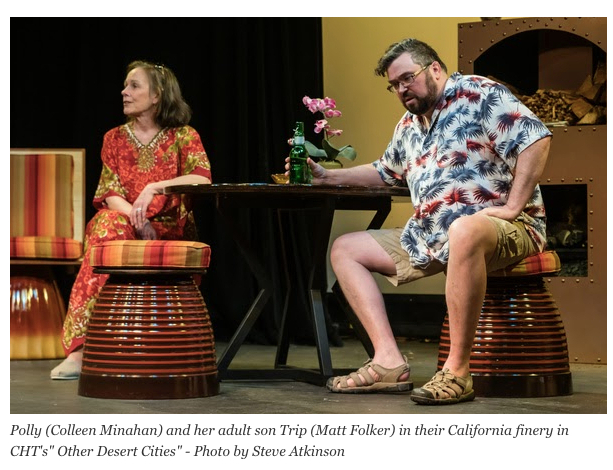 Christmas 2004 in the California desert, with a family reunion–and a family secret. That’s the setting for John Robert Baitz’s Other Desert Cities, currently playing at Church Hill Theatre. Directed by Michael Whitehill, the play is an unexpected gem with an exceptional cast.
Christmas 2004 in the California desert, with a family reunion–and a family secret. That’s the setting for John Robert Baitz’s Other Desert Cities, currently playing at Church Hill Theatre. Directed by Michael Whitehill, the play is an unexpected gem with an exceptional cast.
Baitz’s play opened off-Broadway in 2011; after a limited run, it reopened on Broadway, with a cast including stage stars Stockard Channing, Judith Light, Stacy Keach, Thomas Sadoski, and Rachel Griffiths. It garnered five Tony nominations, and Light won Best Featured Actress for her portrayal of Silda, the alcoholic aunt. It was also a finalist for the Best Drama Pulitzer Prize.
The plot centers on Brooke Wyeth, who has built a career as a magazine writer in New York. As the play begins, she has returned home for Christmas, bringing along the manuscript of a new book that has been accepted for publication. Her parents, Lyman and Polly, made their fame and fortune in movies and in Republican politics under the Reagan administration. They used to lunch with Ron and Nancy! Now they are retired, living in upscale but rather isolated Palm Springs. Also there for Christmas are the younger brother Trip, the producer of a popular reality TV show and Aunt Silda, their mother’s sister, who is in rehab for alcoholism.
There’s friction from the beginning–Brooke and her parents are at opposite ends of the political spectrum. Polly snipes at her daughter’s liberal views. Things get really intense when they learn that Brooke’s book is a memoir focused on the family tragedy; the death—now many years ago—of the older brother. This death traumatized every family member, each in a different way, and has continued to mold family relationships over the years. Brooke was close to her idolized older brother and has never gotten over his loss. The parents—shocked and hurt—try to convince Brooke not to  publish. They don’t want to re-open old wounds. Brooke, however, wants to tell her story to the world. It’s part therapy and part revenge.
publish. They don’t want to re-open old wounds. Brooke, however, wants to tell her story to the world. It’s part therapy and part revenge.
Thus starts a serious and intense family drama as one side tries to discuss and possibly resolve, perhaps heal, old hurts while the other contends that it’s best to move on, leave the past behind, and just have a good visit and a happy Christmas. It takes an unexpected revelation before healing can start for this family.
It’s a serious play about people who clearly love each other but are ignoring and covering up serious trauma. There are also lighter moments along the way. While Brooke and her parents squabble and snipe, brother Trip and Aunt Silda try to keep the holiday spirit. They provide both comic relief and good doses of common sense. The audience laughed a lot on opening night when we saw the play.
This outstanding cast features Christine Kinlock in the role of Brooke Wyeth, the daughter. Kinlock, who most recently played Gwendolyn in The Importance of Being Earnest, effectively conveys the character’s anxiety over her family’s reaction to the book, displaying a nervous energy that fills the stage. Kinlock succeeds admirably.
Colleen Minahan, who has local stage credits with Shore Shakespeare and Church Hill Theatre, plays Polly, the mother. Her character is brash and combative, seemingly caught up in the lifestyle of the country club set and the conservative political scene. Minahan portrays  the character as initially cold toward her daughter and sister, rejecting their liberal values and different lifestyle choices. But as the arguments over the memoir build, the character’s depth emerges, bringing out both warmth and genuine concern for everyone. Minahan brings the character to life in an excellent performance.
the character as initially cold toward her daughter and sister, rejecting their liberal values and different lifestyle choices. But as the arguments over the memoir build, the character’s depth emerges, bringing out both warmth and genuine concern for everyone. Minahan brings the character to life in an excellent performance.
Kathy Jones, one of the most versatile actors in the local theater scene, is well cast as Silda Grauman, Polly’s sister. Her character has most of the play’s best comic lines, but behind the stream of wisecracks is a tortured soul who draws on her own pain to give Brooke sage advice. And she has her own secret. Jones captures both sides of Silda’s character to deliver a rounded portrayal of a very real human being. Kudos for a strong performance.
The father, Lyman, is played by Brian McGunigle, previously seen as the vicar in The Importance of Being Earnest. His character is caught between the desire to give his daughter the support she wants while keeping hidden the troubling family secret that the memoir threatens to expose. He especially fears the probable repercussions of an upcoming article about the book in a national magazine. McGunigle brings out the nuances of the father’s character, who tries to walk a fine line between his wife and his daughter and his own preference to let the past stay in the past. A fine job.
CHT stalwart Matt Folker plays Trip, the younger Wyeth son. Probably the most laid-back character in the play, he seconds Silda’s attempts to lower the level of tension. He was only five so hardly remembers his older brother, yet he too has been affected. Very well done–as we’ve come to expect from this fine actor.
The set, designed and built by Whitehill, is a quintessential California living room, with open spaces and desert-like colors. In one scene, Polly wears a gorgeous kaftan with bright reds, golds and oranges almost exactly matching the furniture and decor—how Californian! In other scenes they wear their tennis whites while Trip sports a vivid Hawaiian shirt with palm trees.
Whitehill noted that this was one of the best and easiest casts to direct. Rehearsals went smoothly with all the drama on-stage, not back-stage!
Anyone who enjoys good acting and strong drama with serious insights into human nature should make it a point to see this play.
Other Desert Cities runs through Feb. 2, performances at 8 p.m. Fridays and Saturdays and 2 p.m. Sundays. Call the theater at 410-556-6003 or visit the theater website – www.churchilltheatre.org – for reservations. Note that the script has adult language and situations that may be inappropriate for younger audiences.
Don’t miss the latest! You can subscribe to The Chestertown Spy‘s free Daily Intelligence Report here



Write a Letter to the Editor on this Article
We encourage readers to offer their point of view on this article by submitting the following form. Editing is sometimes necessary and is done at the discretion of the editorial staff.